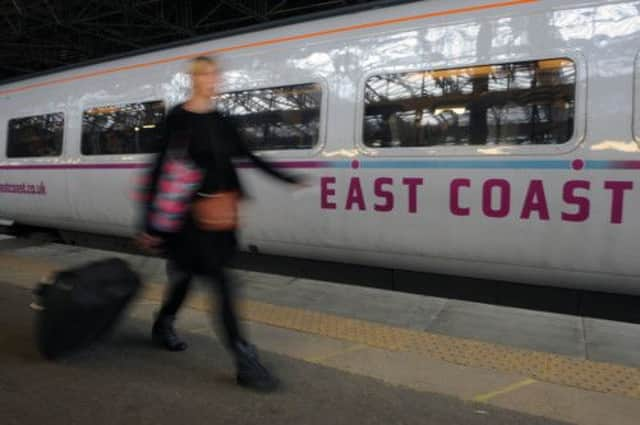Scotland-London rail route in £208m taxpayer boost


Directly Operated Railways (DOR), the company that has held the franchise since 2009, returned £208.7m to taxpayers in the year to March, an increase of 6.6 per cent on the previous year, as turnover grew 4.2 per cent to £693.8m.
Chief executive Michael Holden saw his salary increase to £224,800, up from £156,100 the previous year.
Advertisement
Hide AdAdvertisement
Hide AdDOR chairman Doug Sutherland said East Coast had recorded improved levels of customer satisfaction and punctuality over the period, and it continued to invest in its facilities.
Sutherland added: “The business plan for the remainder of the franchise during 2013-14 and the first two months of 2015 will see the good work continuing, with the twin aims of ensuring a successful transfer of the business back to the private sector – in good condition, and maximising the value of the franchise achieved by the government and the taxpayer.”
Bob Crow, general secretary of the RMT Union, said the figures “destroy” the government’s case for returning the franchise to the private sector.
However, the government intends to press ahead with its plan to get the service in the hands of a new operator by February 2015.
Among those expected to bid is Virgin Trains, whose chief operating officer Chris Gibb is to join the board of infrastructure owner Network Rail as a non-executive director.
The appointment of the self-confessed “lifetime railwayman” follows a six-month secondment to Network Rail last year, when he led a taskforce aimed at improving reliability on the West Coast main line – a route that was handed to rival FirstGroup before the UK government discovered “significant flaws” in the franchise process.
Virgin Trains, jointly owned by Perth-based transport giant Stagecoach and Sir Richard Branson’s Virgin Group, will continue to run the West Coast route until 2017 and is eyeing a bid for the East Coast main line.
Channel Tunnel high-speed train operator Eurostar and French firm Keolis are also making a joint pitch for the route between London, Aberdeen and Inverness, which has been in public ownership since 2009. Gibb, who began his career as a clerical officer at British Rail in 1981, steps down this month after ten years with Virgin. Network Rail chairman Richard Parry-Jones said: “Chris brings with him decades of invaluable experience, providing first-hand expertise of the wide range of issues facing train operators and Network Rail.”
Advertisement
Hide AdAdvertisement
Hide AdTony Collins, who has been chief executive of Virgin Trains for the past nine years, is also standing down but will remain as a consultant to the company.
Branson said: “Tony is passing the baton to a hugely experienced senior management team at Virgin Trains who are focused on how we can make services even better for our customers on what is on the backbone of the UK rail network.”
Stagecoach chief executive Martin Griffiths and Virgin Group senior partner Patrick McCall have been named joint executive chairmen, overseeing the operator’s management team and driving its “bid and growth strategy”.